


2019 7 Series (G12 LCI, facelift 2019)
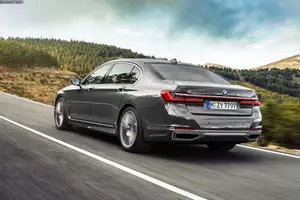
2019 7 Series (G11 LCI, facelift 2019)
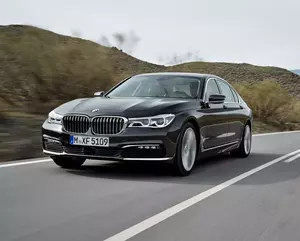
2015 7 Series (G11)
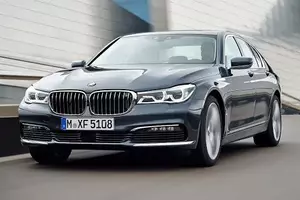
2015 7 Series (G12)
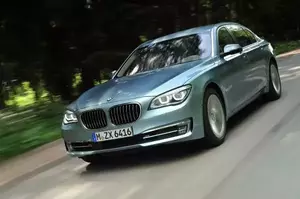
2012 7 Series ActiveHybrid (F01h LCI, facelift 2012)
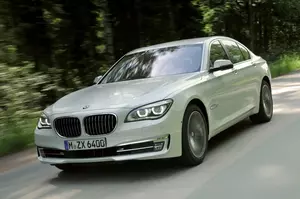
2012 7 Series (F02 LCI, facelift 2012)

2012 7 Series (F01 LCI, facelift 2012)
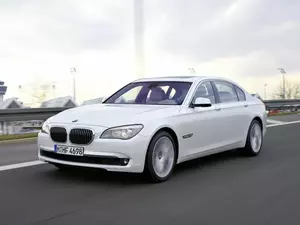
2008 7 Series (F02)
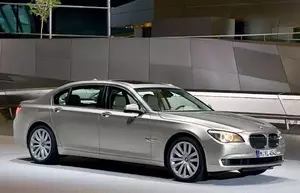
2008 7 Series (F01)
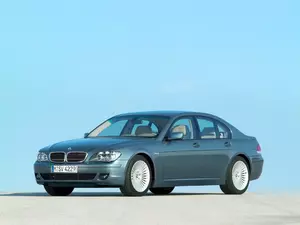
2005 7 Series (E66, facelift 2005)
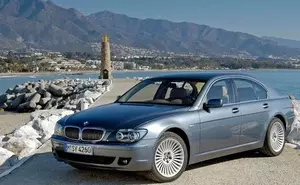
2005 7 Series (E65, facelift 2005)
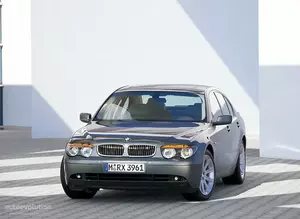
2001 7 Series (E65)
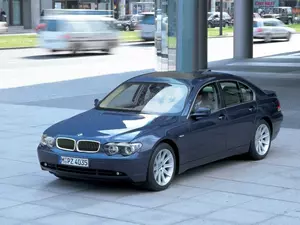
2001 7 Series (E66)
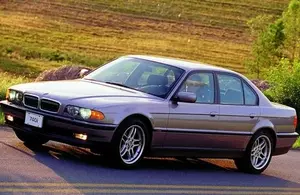
1998 7 Series (E38, facelift 1998)

1998 7 Series L (E38, facelift 1998)
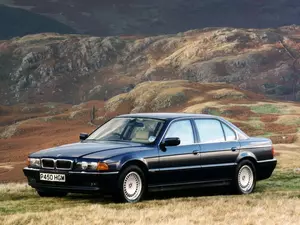
1994 7 Series L (E38)
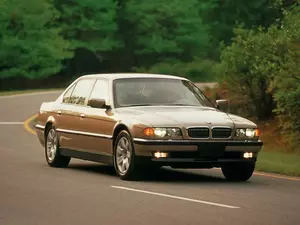
1994 7 Series (E38)
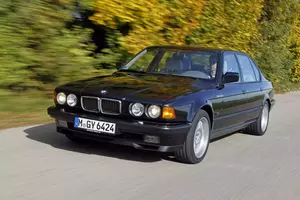
1992 7 Series (E32, facelift 1992)
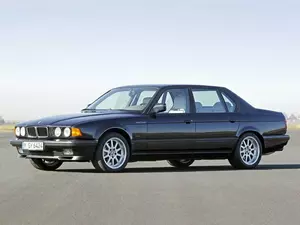
1986 7 Series (E32)
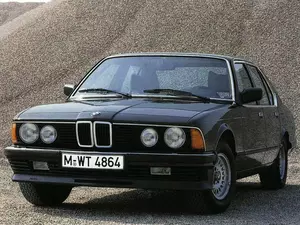
1983 7 Series (E23, facelift 1983)
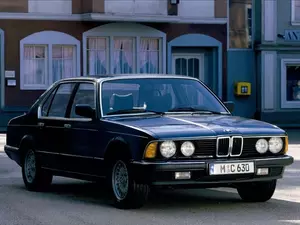
1977 7 Series (E23)

| Vehicle | Precise engine size | Difference from world average | Engine size to consumption ratio | Horsepower from 1 L | Engine size to 100 kg of weight |
|---|---|---|---|---|---|
| 750Li |
4.4 L (4395 cc) |
87.3% bigger | 176 cc to 1 mpg | 120 hp from 1 L | 209 cc to 100 kg |
| M760Li |
6.59 L (6592 cc) |
181% bigger | 347 cc to 1 mpg | 89 hp from 1 L | 287 cc to 100 kg |
| 745Le |
3 L (2998 cc) |
27.8% bigger | 28 cc to 1 mpg | 95 hp from 1 L | 143 cc to 100 kg |
| 730Ld |
2.99 L (2993 cc) |
27.6% bigger | 71 cc to 1 mpg | 89 hp from 1 L | 150 cc to 100 kg |
| 740Ld |
2.99 L (2993 cc) |
27.6% bigger | 73 cc to 1 mpg | 107 hp from 1 L | 150 cc to 100 kg |
| 750Ld |
2.99 L (2993 cc) |
27.6% bigger | 75 cc to 1 mpg | 134 hp from 1 L | 143 cc to 100 kg |
| 740Le |
3 L (2998 cc) |
27.8% bigger | - | 95 hp from 1 L | 143 cc to 100 kg |
| Vehicle | 750Li |
|---|---|
| Precise engine size | 4.4 L (4395 cc) |
| Difference from world average | 87.3 bigger |
| Engine size to consumption ratio | 176 cc to 1 mpg |
| Horsepower from 1 L | 120 hp from 1 L |
| Engine size to 100 kg of weight | 209 cc to 100 kg |
| Vehicle | M760Li |
| Precise engine size | 6.59 L (6592 cc) |
| Difference from world average | 181 bigger |
| Engine size to consumption ratio | 347 cc to 1 mpg |
| Horsepower from 1 L | 89 hp from 1 L |
| Engine size to 100 kg of weight | 287 cc to 100 kg |
| Vehicle | 745Le |
| Precise engine size | 3 L (2998 cc) |
| Difference from world average | 27.8 bigger |
| Engine size to consumption ratio | 28 cc to 1 mpg |
| Horsepower from 1 L | 95 hp from 1 L |
| Engine size to 100 kg of weight | 143 cc to 100 kg |
| Vehicle | 730Ld |
| Precise engine size | 2.99 L (2993 cc) |
| Difference from world average | 27.6 bigger |
| Engine size to consumption ratio | 71 cc to 1 mpg |
| Horsepower from 1 L | 89 hp from 1 L |
| Engine size to 100 kg of weight | 150 cc to 100 kg |
| Vehicle | 740Ld |
| Precise engine size | 2.99 L (2993 cc) |
| Difference from world average | 27.6 bigger |
| Engine size to consumption ratio | 73 cc to 1 mpg |
| Horsepower from 1 L | 107 hp from 1 L |
| Engine size to 100 kg of weight | 150 cc to 100 kg |
| Vehicle | 750Ld |
| Precise engine size | 2.99 L (2993 cc) |
| Difference from world average | 27.6 bigger |
| Engine size to consumption ratio | 75 cc to 1 mpg |
| Horsepower from 1 L | 134 hp from 1 L |
| Engine size to 100 kg of weight | 143 cc to 100 kg |
| Vehicle | 740Le |
| Precise engine size | 3 L (2998 cc) |
| Difference from world average | 27.8 bigger |
| Engine size to consumption ratio | - |
| Horsepower from 1 L | 95 hp from 1 L |
| Engine size to 100 kg of weight | 143 cc to 100 kg |

| Vehicle | Precise engine size | Difference from world average | Engine size to consumption ratio | Horsepower from 1 L | Engine size to 100 kg of weight |
|---|---|---|---|---|---|
| 750i |
4.4 L (4395 cc) |
87.3% bigger | 176 cc to 1 mpg | 120 hp from 1 L | 220 cc to 100 kg |
| 745e |
3 L (2998 cc) |
27.8% bigger | 27 cc to 1 mpg | 95 hp from 1 L | 143 cc to 100 kg |
| 730d |
2.99 L (2993 cc) |
27.6% bigger | 70 cc to 1 mpg | 89 hp from 1 L | 150 cc to 100 kg |
| 740d |
2.99 L (2993 cc) |
27.6% bigger | 71 cc to 1 mpg | 107 hp from 1 L | 150 cc to 100 kg |
| 750d |
2.99 L (2993 cc) |
27.6% bigger | 73 cc to 1 mpg | 134 hp from 1 L | 150 cc to 100 kg |
| Vehicle | 750i |
|---|---|
| Precise engine size | 4.4 L (4395 cc) |
| Difference from world average | 87.3 bigger |
| Engine size to consumption ratio | 176 cc to 1 mpg |
| Horsepower from 1 L | 120 hp from 1 L |
| Engine size to 100 kg of weight | 220 cc to 100 kg |
| Vehicle | 745e |
| Precise engine size | 3 L (2998 cc) |
| Difference from world average | 27.8 bigger |
| Engine size to consumption ratio | 27 cc to 1 mpg |
| Horsepower from 1 L | 95 hp from 1 L |
| Engine size to 100 kg of weight | 143 cc to 100 kg |
| Vehicle | 730d |
| Precise engine size | 2.99 L (2993 cc) |
| Difference from world average | 27.6 bigger |
| Engine size to consumption ratio | 70 cc to 1 mpg |
| Horsepower from 1 L | 89 hp from 1 L |
| Engine size to 100 kg of weight | 150 cc to 100 kg |
| Vehicle | 740d |
| Precise engine size | 2.99 L (2993 cc) |
| Difference from world average | 27.6 bigger |
| Engine size to consumption ratio | 71 cc to 1 mpg |
| Horsepower from 1 L | 107 hp from 1 L |
| Engine size to 100 kg of weight | 150 cc to 100 kg |
| Vehicle | 750d |
| Precise engine size | 2.99 L (2993 cc) |
| Difference from world average | 27.6 bigger |
| Engine size to consumption ratio | 73 cc to 1 mpg |
| Horsepower from 1 L | 134 hp from 1 L |
| Engine size to 100 kg of weight | 150 cc to 100 kg |

| Vehicle | Precise engine size | Difference from world average | Engine size to consumption ratio | Horsepower from 1 L | Engine size to 100 kg of weight |
|---|---|---|---|---|---|
| 730d |
2.99 L (2993 cc) |
27.6% bigger | 61 cc to 1 mpg | 89 hp from 1 L | 166 cc to 100 kg |
| 740d |
2.99 L (2993 cc) |
27.6% bigger | 62 cc to 1 mpg | 107 hp from 1 L | 158 cc to 100 kg |
| 740i |
3 L (2998 cc) |
27.8% bigger | 83 cc to 1 mpg | 109 hp from 1 L | 176 cc to 100 kg |
| 750i |
4.4 L (4395 cc) |
87.3% bigger | 152 cc to 1 mpg | 102 hp from 1 L | 231 cc to 100 kg |
| 740e |
2 L (1998 cc) |
14.8% smaller | 17 cc to 1 mpg | 129 hp from 1 L | 105 cc to 100 kg |
| 750d |
2.99 L (2993 cc) |
27.6% bigger | 79 cc to 1 mpg | 134 hp from 1 L | 150 cc to 100 kg |
| Vehicle | 730d |
|---|---|
| Precise engine size | 2.99 L (2993 cc) |
| Difference from world average | 27.6 bigger |
| Engine size to consumption ratio | 61 cc to 1 mpg |
| Horsepower from 1 L | 89 hp from 1 L |
| Engine size to 100 kg of weight | 166 cc to 100 kg |
| Vehicle | 740d |
| Precise engine size | 2.99 L (2993 cc) |
| Difference from world average | 27.6 bigger |
| Engine size to consumption ratio | 62 cc to 1 mpg |
| Horsepower from 1 L | 107 hp from 1 L |
| Engine size to 100 kg of weight | 158 cc to 100 kg |
| Vehicle | 740i |
| Precise engine size | 3 L (2998 cc) |
| Difference from world average | 27.8 bigger |
| Engine size to consumption ratio | 83 cc to 1 mpg |
| Horsepower from 1 L | 109 hp from 1 L |
| Engine size to 100 kg of weight | 176 cc to 100 kg |
| Vehicle | 750i |
| Precise engine size | 4.4 L (4395 cc) |
| Difference from world average | 87.3 bigger |
| Engine size to consumption ratio | 152 cc to 1 mpg |
| Horsepower from 1 L | 102 hp from 1 L |
| Engine size to 100 kg of weight | 231 cc to 100 kg |
| Vehicle | 740e |
| Precise engine size | 2 L (1998 cc) |
| Difference from world average | 14.8 smaller |
| Engine size to consumption ratio | 17 cc to 1 mpg |
| Horsepower from 1 L | 129 hp from 1 L |
| Engine size to 100 kg of weight | 105 cc to 100 kg |
| Vehicle | 750d |
| Precise engine size | 2.99 L (2993 cc) |
| Difference from world average | 27.6 bigger |
| Engine size to consumption ratio | 79 cc to 1 mpg |
| Horsepower from 1 L | 134 hp from 1 L |
| Engine size to 100 kg of weight | 150 cc to 100 kg |

| Vehicle | Precise engine size | Difference from world average | Engine size to consumption ratio | Horsepower from 1 L | Engine size to 100 kg of weight |
|---|---|---|---|---|---|
| 730Ld |
2.99 L (2993 cc) |
27.6% bigger | 59 cc to 1 mpg | 89 hp from 1 L | 166 cc to 100 kg |
| 740Li |
3 L (2998 cc) |
27.8% bigger | 88 cc to 1 mpg | 109 hp from 1 L | 167 cc to 100 kg |
| 740Ld |
2.99 L (2993 cc) |
27.6% bigger | 64 cc to 1 mpg | 107 hp from 1 L | 158 cc to 100 kg |
| 750Li |
4.4 L (4395 cc) |
87.3% bigger | 157 cc to 1 mpg | 102 hp from 1 L | 231 cc to 100 kg |
| M760Li |
6.59 L (6592 cc) |
181% bigger | 366 cc to 1 mpg | 93 hp from 1 L | 300 cc to 100 kg |
| 740Le |
2 L (1998 cc) |
14.8% smaller | 18 cc to 1 mpg | 129 hp from 1 L | 100 cc to 100 kg |
| 750Ld |
2.99 L (2993 cc) |
27.6% bigger | 81 cc to 1 mpg | 134 hp from 1 L | 150 cc to 100 kg |
| Vehicle | 730Ld |
|---|---|
| Precise engine size | 2.99 L (2993 cc) |
| Difference from world average | 27.6 bigger |
| Engine size to consumption ratio | 59 cc to 1 mpg |
| Horsepower from 1 L | 89 hp from 1 L |
| Engine size to 100 kg of weight | 166 cc to 100 kg |
| Vehicle | 740Li |
| Precise engine size | 3 L (2998 cc) |
| Difference from world average | 27.8 bigger |
| Engine size to consumption ratio | 88 cc to 1 mpg |
| Horsepower from 1 L | 109 hp from 1 L |
| Engine size to 100 kg of weight | 167 cc to 100 kg |
| Vehicle | 740Ld |
| Precise engine size | 2.99 L (2993 cc) |
| Difference from world average | 27.6 bigger |
| Engine size to consumption ratio | 64 cc to 1 mpg |
| Horsepower from 1 L | 107 hp from 1 L |
| Engine size to 100 kg of weight | 158 cc to 100 kg |
| Vehicle | 750Li |
| Precise engine size | 4.4 L (4395 cc) |
| Difference from world average | 87.3 bigger |
| Engine size to consumption ratio | 157 cc to 1 mpg |
| Horsepower from 1 L | 102 hp from 1 L |
| Engine size to 100 kg of weight | 231 cc to 100 kg |
| Vehicle | M760Li |
| Precise engine size | 6.59 L (6592 cc) |
| Difference from world average | 181 bigger |
| Engine size to consumption ratio | 366 cc to 1 mpg |
| Horsepower from 1 L | 93 hp from 1 L |
| Engine size to 100 kg of weight | 300 cc to 100 kg |
| Vehicle | 740Le |
| Precise engine size | 2 L (1998 cc) |
| Difference from world average | 14.8 smaller |
| Engine size to consumption ratio | 18 cc to 1 mpg |
| Horsepower from 1 L | 129 hp from 1 L |
| Engine size to 100 kg of weight | 100 cc to 100 kg |
| Vehicle | 750Ld |
| Precise engine size | 2.99 L (2993 cc) |
| Difference from world average | 27.6 bigger |
| Engine size to consumption ratio | 81 cc to 1 mpg |
| Horsepower from 1 L | 134 hp from 1 L |
| Engine size to 100 kg of weight | 150 cc to 100 kg |

| Vehicle | Precise engine size | Difference from world average | Engine size to consumption ratio | Horsepower from 1 L | Engine size to 100 kg of weight |
|---|---|---|---|---|---|
| 7 ActiveHybrid |
2.98 L (2979 cc) |
27% bigger | 85 cc to 1 mpg | 107 hp from 1 L | 149 cc to 100 kg |
| 7 ActiveHybrid L |
2.98 L (2979 cc) |
27% bigger | 85 cc to 1 mpg | 107 hp from 1 L | 142 cc to 100 kg |
| Vehicle | 7 ActiveHybrid |
|---|---|
| Precise engine size | 2.98 L (2979 cc) |
| Difference from world average | 27 bigger |
| Engine size to consumption ratio | 85 cc to 1 mpg |
| Horsepower from 1 L | 107 hp from 1 L |
| Engine size to 100 kg of weight | 149 cc to 100 kg |
| Vehicle | 7 ActiveHybrid L |
| Precise engine size | 2.98 L (2979 cc) |
| Difference from world average | 27 bigger |
| Engine size to consumption ratio | 85 cc to 1 mpg |
| Horsepower from 1 L | 107 hp from 1 L |
| Engine size to 100 kg of weight | 142 cc to 100 kg |

| Vehicle | Precise engine size | Difference from world average | Engine size to consumption ratio | Horsepower from 1 L | Engine size to 100 kg of weight |
|---|---|---|---|---|---|
| 730Li |
3 L (2996 cc) |
27.7% bigger | 111 cc to 1 mpg | 86 hp from 1 L | 158 cc to 100 kg |
| 740Li |
2.98 L (2979 cc) |
27% bigger | 106 cc to 1 mpg | 107 hp from 1 L | 149 cc to 100 kg |
| 760Li |
5.97 L (5972 cc) |
154.6% bigger | 332 cc to 1 mpg | 91 hp from 1 L | 260 cc to 100 kg |
| 750Li |
4.4 L (4395 cc) |
87.3% bigger | 176 cc to 1 mpg | 102 hp from 1 L | 209 cc to 100 kg |
| 730Ld |
2.99 L (2993 cc) |
27.6% bigger | 71 cc to 1 mpg | 86 hp from 1 L | 150 cc to 100 kg |
| 750Ld |
2.99 L (2993 cc) |
27.6% bigger | 81 cc to 1 mpg | 127 hp from 1 L | 143 cc to 100 kg |
| Vehicle | 730Li |
|---|---|
| Precise engine size | 3 L (2996 cc) |
| Difference from world average | 27.7 bigger |
| Engine size to consumption ratio | 111 cc to 1 mpg |
| Horsepower from 1 L | 86 hp from 1 L |
| Engine size to 100 kg of weight | 158 cc to 100 kg |
| Vehicle | 740Li |
| Precise engine size | 2.98 L (2979 cc) |
| Difference from world average | 27 bigger |
| Engine size to consumption ratio | 106 cc to 1 mpg |
| Horsepower from 1 L | 107 hp from 1 L |
| Engine size to 100 kg of weight | 149 cc to 100 kg |
| Vehicle | 760Li |
| Precise engine size | 5.97 L (5972 cc) |
| Difference from world average | 154.6 bigger |
| Engine size to consumption ratio | 332 cc to 1 mpg |
| Horsepower from 1 L | 91 hp from 1 L |
| Engine size to 100 kg of weight | 260 cc to 100 kg |
| Vehicle | 750Li |
| Precise engine size | 4.4 L (4395 cc) |
| Difference from world average | 87.3 bigger |
| Engine size to consumption ratio | 176 cc to 1 mpg |
| Horsepower from 1 L | 102 hp from 1 L |
| Engine size to 100 kg of weight | 209 cc to 100 kg |
| Vehicle | 730Ld |
| Precise engine size | 2.99 L (2993 cc) |
| Difference from world average | 27.6 bigger |
| Engine size to consumption ratio | 71 cc to 1 mpg |
| Horsepower from 1 L | 86 hp from 1 L |
| Engine size to 100 kg of weight | 150 cc to 100 kg |
| Vehicle | 750Ld |
| Precise engine size | 2.99 L (2993 cc) |
| Difference from world average | 27.6 bigger |
| Engine size to consumption ratio | 81 cc to 1 mpg |
| Horsepower from 1 L | 127 hp from 1 L |
| Engine size to 100 kg of weight | 143 cc to 100 kg |

| Vehicle | Precise engine size | Difference from world average | Engine size to consumption ratio | Horsepower from 1 L | Engine size to 100 kg of weight |
|---|---|---|---|---|---|
| 730i |
3 L (2996 cc) |
27.7% bigger | 111 cc to 1 mpg | 86 hp from 1 L | 166 cc to 100 kg |
| 740i |
2.98 L (2979 cc) |
27% bigger | 99 cc to 1 mpg | 107 hp from 1 L | 157 cc to 100 kg |
| 750i |
4.4 L (4395 cc) |
87.3% bigger | 176 cc to 1 mpg | 102 hp from 1 L | 209 cc to 100 kg |
| 760i |
5.97 L (5972 cc) |
154.6% bigger | 332 cc to 1 mpg | 91 hp from 1 L | 271 cc to 100 kg |
| 730d |
2.99 L (2993 cc) |
27.6% bigger | 77 cc to 1 mpg | 86 hp from 1 L | 150 cc to 100 kg |
| 740d |
2.99 L (2993 cc) |
27.6% bigger | 77 cc to 1 mpg | 105 hp from 1 L | 150 cc to 100 kg |
| 750d |
2.99 L (2993 cc) |
27.6% bigger | 81 cc to 1 mpg | 127 hp from 1 L | 143 cc to 100 kg |
| Vehicle | 730i |
|---|---|
| Precise engine size | 3 L (2996 cc) |
| Difference from world average | 27.7 bigger |
| Engine size to consumption ratio | 111 cc to 1 mpg |
| Horsepower from 1 L | 86 hp from 1 L |
| Engine size to 100 kg of weight | 166 cc to 100 kg |
| Vehicle | 740i |
| Precise engine size | 2.98 L (2979 cc) |
| Difference from world average | 27 bigger |
| Engine size to consumption ratio | 99 cc to 1 mpg |
| Horsepower from 1 L | 107 hp from 1 L |
| Engine size to 100 kg of weight | 157 cc to 100 kg |
| Vehicle | 750i |
| Precise engine size | 4.4 L (4395 cc) |
| Difference from world average | 87.3 bigger |
| Engine size to consumption ratio | 176 cc to 1 mpg |
| Horsepower from 1 L | 102 hp from 1 L |
| Engine size to 100 kg of weight | 209 cc to 100 kg |
| Vehicle | 760i |
| Precise engine size | 5.97 L (5972 cc) |
| Difference from world average | 154.6 bigger |
| Engine size to consumption ratio | 332 cc to 1 mpg |
| Horsepower from 1 L | 91 hp from 1 L |
| Engine size to 100 kg of weight | 271 cc to 100 kg |
| Vehicle | 730d |
| Precise engine size | 2.99 L (2993 cc) |
| Difference from world average | 27.6 bigger |
| Engine size to consumption ratio | 77 cc to 1 mpg |
| Horsepower from 1 L | 86 hp from 1 L |
| Engine size to 100 kg of weight | 150 cc to 100 kg |
| Vehicle | 740d |
| Precise engine size | 2.99 L (2993 cc) |
| Difference from world average | 27.6 bigger |
| Engine size to consumption ratio | 77 cc to 1 mpg |
| Horsepower from 1 L | 105 hp from 1 L |
| Engine size to 100 kg of weight | 150 cc to 100 kg |
| Vehicle | 750d |
| Precise engine size | 2.99 L (2993 cc) |
| Difference from world average | 27.6 bigger |
| Engine size to consumption ratio | 81 cc to 1 mpg |
| Horsepower from 1 L | 127 hp from 1 L |
| Engine size to 100 kg of weight | 143 cc to 100 kg |

| Vehicle | Precise engine size | Difference from world average | Engine size to consumption ratio | Horsepower from 1 L | Engine size to 100 kg of weight |
|---|---|---|---|---|---|
| 750i |
4.4 L (4395 cc) |
87.3% bigger | 220 cc to 1 mpg | 93 hp from 1 L | 209 cc to 100 kg |
| 740Li |
2.98 L (2979 cc) |
27% bigger | 124 cc to 1 mpg | 109 hp from 1 L | 157 cc to 100 kg |
| 750Li |
4.4 L (4395 cc) |
87.3% bigger | 209 cc to 1 mpg | 93 hp from 1 L | 220 cc to 100 kg |
| 760Li |
5.97 L (5972 cc) |
154.6% bigger | 332 cc to 1 mpg | 91 hp from 1 L | 260 cc to 100 kg |
| 730Ld |
2.99 L (2993 cc) |
27.6% bigger | 88 cc to 1 mpg | 82 hp from 1 L | 150 cc to 100 kg |
| Vehicle | 750i |
|---|---|
| Precise engine size | 4.4 L (4395 cc) |
| Difference from world average | 87.3 bigger |
| Engine size to consumption ratio | 220 cc to 1 mpg |
| Horsepower from 1 L | 93 hp from 1 L |
| Engine size to 100 kg of weight | 209 cc to 100 kg |
| Vehicle | 740Li |
| Precise engine size | 2.98 L (2979 cc) |
| Difference from world average | 27 bigger |
| Engine size to consumption ratio | 124 cc to 1 mpg |
| Horsepower from 1 L | 109 hp from 1 L |
| Engine size to 100 kg of weight | 157 cc to 100 kg |
| Vehicle | 750Li |
| Precise engine size | 4.4 L (4395 cc) |
| Difference from world average | 87.3 bigger |
| Engine size to consumption ratio | 209 cc to 1 mpg |
| Horsepower from 1 L | 93 hp from 1 L |
| Engine size to 100 kg of weight | 220 cc to 100 kg |
| Vehicle | 760Li |
| Precise engine size | 5.97 L (5972 cc) |
| Difference from world average | 154.6 bigger |
| Engine size to consumption ratio | 332 cc to 1 mpg |
| Horsepower from 1 L | 91 hp from 1 L |
| Engine size to 100 kg of weight | 260 cc to 100 kg |
| Vehicle | 730Ld |
| Precise engine size | 2.99 L (2993 cc) |
| Difference from world average | 27.6 bigger |
| Engine size to consumption ratio | 88 cc to 1 mpg |
| Horsepower from 1 L | 82 hp from 1 L |
| Engine size to 100 kg of weight | 150 cc to 100 kg |

| Vehicle | Precise engine size | Difference from world average | Engine size to consumption ratio | Horsepower from 1 L | Engine size to 100 kg of weight |
|---|---|---|---|---|---|
| 750i |
4.4 L (4395 cc) |
87.3% bigger | 209 cc to 1 mpg | 93 hp from 1 L | 231 cc to 100 kg |
| 730d |
2.99 L (2993 cc) |
27.6% bigger | 91 cc to 1 mpg | 82 hp from 1 L | 158 cc to 100 kg |
| 740i |
2.98 L (2979 cc) |
27% bigger | 124 cc to 1 mpg | 109 hp from 1 L | 157 cc to 100 kg |
| 740d |
2.99 L (2993 cc) |
27.6% bigger | 88 cc to 1 mpg | 102 hp from 1 L | 150 cc to 100 kg |
| 760i |
5.97 L (5972 cc) |
154.6% bigger | 332 cc to 1 mpg | 91 hp from 1 L | 271 cc to 100 kg |
| Vehicle | 750i |
|---|---|
| Precise engine size | 4.4 L (4395 cc) |
| Difference from world average | 87.3 bigger |
| Engine size to consumption ratio | 209 cc to 1 mpg |
| Horsepower from 1 L | 93 hp from 1 L |
| Engine size to 100 kg of weight | 231 cc to 100 kg |
| Vehicle | 730d |
| Precise engine size | 2.99 L (2993 cc) |
| Difference from world average | 27.6 bigger |
| Engine size to consumption ratio | 91 cc to 1 mpg |
| Horsepower from 1 L | 82 hp from 1 L |
| Engine size to 100 kg of weight | 158 cc to 100 kg |
| Vehicle | 740i |
| Precise engine size | 2.98 L (2979 cc) |
| Difference from world average | 27 bigger |
| Engine size to consumption ratio | 124 cc to 1 mpg |
| Horsepower from 1 L | 109 hp from 1 L |
| Engine size to 100 kg of weight | 157 cc to 100 kg |
| Vehicle | 740d |
| Precise engine size | 2.99 L (2993 cc) |
| Difference from world average | 27.6 bigger |
| Engine size to consumption ratio | 88 cc to 1 mpg |
| Horsepower from 1 L | 102 hp from 1 L |
| Engine size to 100 kg of weight | 150 cc to 100 kg |
| Vehicle | 760i |
| Precise engine size | 5.97 L (5972 cc) |
| Difference from world average | 154.6 bigger |
| Engine size to consumption ratio | 332 cc to 1 mpg |
| Horsepower from 1 L | 91 hp from 1 L |
| Engine size to 100 kg of weight | 271 cc to 100 kg |

| Vehicle | Precise engine size | Difference from world average | Engine size to consumption ratio | Horsepower from 1 L | Engine size to 100 kg of weight |
|---|---|---|---|---|---|
| 730Ld |
2.99 L (2993 cc) |
27.6% bigger | 103 cc to 1 mpg | 77 hp from 1 L | 158 cc to 100 kg |
| 730Li |
3 L (2996 cc) |
27.7% bigger | 130 cc to 1 mpg | 86 hp from 1 L | 166 cc to 100 kg |
| 740Li |
4 L (4000 cc) |
70.5% bigger | 190 cc to 1 mpg | 77 hp from 1 L | 211 cc to 100 kg |
| 750Li |
4.8 L (4799 cc) |
104.6% bigger | 229 cc to 1 mpg | 76 hp from 1 L | 240 cc to 100 kg |
| 760Li |
5.97 L (5972 cc) |
154.6% bigger | 351 cc to 1 mpg | 75 hp from 1 L | 271 cc to 100 kg |
| Vehicle | 730Ld |
|---|---|
| Precise engine size | 2.99 L (2993 cc) |
| Difference from world average | 27.6 bigger |
| Engine size to consumption ratio | 103 cc to 1 mpg |
| Horsepower from 1 L | 77 hp from 1 L |
| Engine size to 100 kg of weight | 158 cc to 100 kg |
| Vehicle | 730Li |
| Precise engine size | 3 L (2996 cc) |
| Difference from world average | 27.7 bigger |
| Engine size to consumption ratio | 130 cc to 1 mpg |
| Horsepower from 1 L | 86 hp from 1 L |
| Engine size to 100 kg of weight | 166 cc to 100 kg |
| Vehicle | 740Li |
| Precise engine size | 4 L (4000 cc) |
| Difference from world average | 70.5 bigger |
| Engine size to consumption ratio | 190 cc to 1 mpg |
| Horsepower from 1 L | 77 hp from 1 L |
| Engine size to 100 kg of weight | 211 cc to 100 kg |
| Vehicle | 750Li |
| Precise engine size | 4.8 L (4799 cc) |
| Difference from world average | 104.6 bigger |
| Engine size to consumption ratio | 229 cc to 1 mpg |
| Horsepower from 1 L | 76 hp from 1 L |
| Engine size to 100 kg of weight | 240 cc to 100 kg |
| Vehicle | 760Li |
| Precise engine size | 5.97 L (5972 cc) |
| Difference from world average | 154.6 bigger |
| Engine size to consumption ratio | 351 cc to 1 mpg |
| Horsepower from 1 L | 75 hp from 1 L |
| Engine size to 100 kg of weight | 271 cc to 100 kg |

| Vehicle | Precise engine size | Difference from world average | Engine size to consumption ratio | Horsepower from 1 L | Engine size to 100 kg of weight |
|---|---|---|---|---|---|
| 730d |
2.99 L (2993 cc) |
27.6% bigger | 100 cc to 1 mpg | 77 hp from 1 L | 158 cc to 100 kg |
| 730i |
3 L (2996 cc) |
27.7% bigger | 130 cc to 1 mpg | 86 hp from 1 L | 166 cc to 100 kg |
| 740i |
4 L (4000 cc) |
70.5% bigger | 190 cc to 1 mpg | 77 hp from 1 L | 211 cc to 100 kg |
| 745d |
4.42 L (4423 cc) |
88.5% bigger | 177 cc to 1 mpg | 68 hp from 1 L | 221 cc to 100 kg |
| 750i |
4.8 L (4799 cc) |
104.6% bigger | 229 cc to 1 mpg | 76 hp from 1 L | 253 cc to 100 kg |
| 760i |
5.97 L (5972 cc) |
154.6% bigger | 351 cc to 1 mpg | 75 hp from 1 L | 284 cc to 100 kg |
| Vehicle | 730d |
|---|---|
| Precise engine size | 2.99 L (2993 cc) |
| Difference from world average | 27.6 bigger |
| Engine size to consumption ratio | 100 cc to 1 mpg |
| Horsepower from 1 L | 77 hp from 1 L |
| Engine size to 100 kg of weight | 158 cc to 100 kg |
| Vehicle | 730i |
| Precise engine size | 3 L (2996 cc) |
| Difference from world average | 27.7 bigger |
| Engine size to consumption ratio | 130 cc to 1 mpg |
| Horsepower from 1 L | 86 hp from 1 L |
| Engine size to 100 kg of weight | 166 cc to 100 kg |
| Vehicle | 740i |
| Precise engine size | 4 L (4000 cc) |
| Difference from world average | 70.5 bigger |
| Engine size to consumption ratio | 190 cc to 1 mpg |
| Horsepower from 1 L | 77 hp from 1 L |
| Engine size to 100 kg of weight | 211 cc to 100 kg |
| Vehicle | 745d |
| Precise engine size | 4.42 L (4423 cc) |
| Difference from world average | 88.5 bigger |
| Engine size to consumption ratio | 177 cc to 1 mpg |
| Horsepower from 1 L | 68 hp from 1 L |
| Engine size to 100 kg of weight | 221 cc to 100 kg |
| Vehicle | 750i |
| Precise engine size | 4.8 L (4799 cc) |
| Difference from world average | 104.6 bigger |
| Engine size to consumption ratio | 229 cc to 1 mpg |
| Horsepower from 1 L | 76 hp from 1 L |
| Engine size to 100 kg of weight | 253 cc to 100 kg |
| Vehicle | 760i |
| Precise engine size | 5.97 L (5972 cc) |
| Difference from world average | 154.6 bigger |
| Engine size to consumption ratio | 351 cc to 1 mpg |
| Horsepower from 1 L | 75 hp from 1 L |
| Engine size to 100 kg of weight | 284 cc to 100 kg |

| Vehicle | Precise engine size | Difference from world average | Engine size to consumption ratio | Horsepower from 1 L | Engine size to 100 kg of weight |
|---|---|---|---|---|---|
| 730d |
2.99 L (2993 cc) |
27.6% bigger | 107 cc to 1 mpg | 73 hp from 1 L | 158 cc to 100 kg |
| 730i |
2.98 L (2979 cc) |
27% bigger | 135 cc to 1 mpg | 78 hp from 1 L | 175 cc to 100 kg |
| 740d |
3.9 L (3901 cc) |
66.3% bigger | 163 cc to 1 mpg | 66 hp from 1 L | 195 cc to 100 kg |
| 735i |
3.6 L (3600 cc) |
53.5% bigger | 171 cc to 1 mpg | 76 hp from 1 L | 189 cc to 100 kg |
| 745i |
4.4 L (4398 cc) |
87.5% bigger | 209 cc to 1 mpg | 76 hp from 1 L | 231 cc to 100 kg |
| 760i |
5.97 L (5972 cc) |
154.6% bigger | 332 cc to 1 mpg | 75 hp from 1 L | 299 cc to 100 kg |
| Vehicle | 730d |
|---|---|
| Precise engine size | 2.99 L (2993 cc) |
| Difference from world average | 27.6 bigger |
| Engine size to consumption ratio | 107 cc to 1 mpg |
| Horsepower from 1 L | 73 hp from 1 L |
| Engine size to 100 kg of weight | 158 cc to 100 kg |
| Vehicle | 730i |
| Precise engine size | 2.98 L (2979 cc) |
| Difference from world average | 27 bigger |
| Engine size to consumption ratio | 135 cc to 1 mpg |
| Horsepower from 1 L | 78 hp from 1 L |
| Engine size to 100 kg of weight | 175 cc to 100 kg |
| Vehicle | 740d |
| Precise engine size | 3.9 L (3901 cc) |
| Difference from world average | 66.3 bigger |
| Engine size to consumption ratio | 163 cc to 1 mpg |
| Horsepower from 1 L | 66 hp from 1 L |
| Engine size to 100 kg of weight | 195 cc to 100 kg |
| Vehicle | 735i |
| Precise engine size | 3.6 L (3600 cc) |
| Difference from world average | 53.5 bigger |
| Engine size to consumption ratio | 171 cc to 1 mpg |
| Horsepower from 1 L | 76 hp from 1 L |
| Engine size to 100 kg of weight | 189 cc to 100 kg |
| Vehicle | 745i |
| Precise engine size | 4.4 L (4398 cc) |
| Difference from world average | 87.5 bigger |
| Engine size to consumption ratio | 209 cc to 1 mpg |
| Horsepower from 1 L | 76 hp from 1 L |
| Engine size to 100 kg of weight | 231 cc to 100 kg |
| Vehicle | 760i |
| Precise engine size | 5.97 L (5972 cc) |
| Difference from world average | 154.6 bigger |
| Engine size to consumption ratio | 332 cc to 1 mpg |
| Horsepower from 1 L | 75 hp from 1 L |
| Engine size to 100 kg of weight | 299 cc to 100 kg |

| Vehicle | Precise engine size | Difference from world average | Engine size to consumption ratio | Horsepower from 1 L | Engine size to 100 kg of weight |
|---|---|---|---|---|---|
| 730Li |
2.98 L (2979 cc) |
27% bigger | 135 cc to 1 mpg | 78 hp from 1 L | 175 cc to 100 kg |
| 735Li |
3.6 L (3600 cc) |
53.5% bigger | 171 cc to 1 mpg | 76 hp from 1 L | 189 cc to 100 kg |
| 745Li |
4.4 L (4398 cc) |
87.5% bigger | 220 cc to 1 mpg | 76 hp from 1 L | 231 cc to 100 kg |
| 760Li |
5.97 L (5972 cc) |
154.6% bigger | 351 cc to 1 mpg | 75 hp from 1 L | 284 cc to 100 kg |
| Vehicle | 730Li |
|---|---|
| Precise engine size | 2.98 L (2979 cc) |
| Difference from world average | 27 bigger |
| Engine size to consumption ratio | 135 cc to 1 mpg |
| Horsepower from 1 L | 78 hp from 1 L |
| Engine size to 100 kg of weight | 175 cc to 100 kg |
| Vehicle | 735Li |
| Precise engine size | 3.6 L (3600 cc) |
| Difference from world average | 53.5 bigger |
| Engine size to consumption ratio | 171 cc to 1 mpg |
| Horsepower from 1 L | 76 hp from 1 L |
| Engine size to 100 kg of weight | 189 cc to 100 kg |
| Vehicle | 745Li |
| Precise engine size | 4.4 L (4398 cc) |
| Difference from world average | 87.5 bigger |
| Engine size to consumption ratio | 220 cc to 1 mpg |
| Horsepower from 1 L | 76 hp from 1 L |
| Engine size to 100 kg of weight | 231 cc to 100 kg |
| Vehicle | 760Li |
| Precise engine size | 5.97 L (5972 cc) |
| Difference from world average | 154.6 bigger |
| Engine size to consumption ratio | 351 cc to 1 mpg |
| Horsepower from 1 L | 75 hp from 1 L |
| Engine size to 100 kg of weight | 284 cc to 100 kg |

| Vehicle | Precise engine size | Difference from world average | Engine size to consumption ratio | Horsepower from 1 L | Engine size to 100 kg of weight |
|---|---|---|---|---|---|
| 728i |
2.79 L (2793 cc) |
19.1% bigger | 116 cc to 1 mpg | 69 hp from 1 L | 164 cc to 100 kg |
| 750i |
5.38 L (5379 cc) |
129.3% bigger | 316 cc to 1 mpg | 61 hp from 1 L | 269 cc to 100 kg |
| 740i |
4.4 L (4398 cc) |
87.5% bigger | 231 cc to 1 mpg | 65 hp from 1 L | 231 cc to 100 kg |
| 725tds |
2.5 L (2497 cc) |
6.4% bigger | 86 cc to 1 mpg | 57 hp from 1 L | 147 cc to 100 kg |
| 730d |
2.93 L (2926 cc) |
24.7% bigger | 108 cc to 1 mpg | 63 hp from 1 L | 163 cc to 100 kg |
| 735i |
3.5 L (3498 cc) |
49.1% bigger | 184 cc to 1 mpg | 68 hp from 1 L | 194 cc to 100 kg |
| 740d |
3.9 L (3901 cc) |
66.3% bigger | 163 cc to 1 mpg | 63 hp from 1 L | 195 cc to 100 kg |
| Vehicle | 728i |
|---|---|
| Precise engine size | 2.79 L (2793 cc) |
| Difference from world average | 19.1 bigger |
| Engine size to consumption ratio | 116 cc to 1 mpg |
| Horsepower from 1 L | 69 hp from 1 L |
| Engine size to 100 kg of weight | 164 cc to 100 kg |
| Vehicle | 750i |
| Precise engine size | 5.38 L (5379 cc) |
| Difference from world average | 129.3 bigger |
| Engine size to consumption ratio | 316 cc to 1 mpg |
| Horsepower from 1 L | 61 hp from 1 L |
| Engine size to 100 kg of weight | 269 cc to 100 kg |
| Vehicle | 740i |
| Precise engine size | 4.4 L (4398 cc) |
| Difference from world average | 87.5 bigger |
| Engine size to consumption ratio | 231 cc to 1 mpg |
| Horsepower from 1 L | 65 hp from 1 L |
| Engine size to 100 kg of weight | 231 cc to 100 kg |
| Vehicle | 725tds |
| Precise engine size | 2.5 L (2497 cc) |
| Difference from world average | 6.4 bigger |
| Engine size to consumption ratio | 86 cc to 1 mpg |
| Horsepower from 1 L | 57 hp from 1 L |
| Engine size to 100 kg of weight | 147 cc to 100 kg |
| Vehicle | 730d |
| Precise engine size | 2.93 L (2926 cc) |
| Difference from world average | 24.7 bigger |
| Engine size to consumption ratio | 108 cc to 1 mpg |
| Horsepower from 1 L | 63 hp from 1 L |
| Engine size to 100 kg of weight | 163 cc to 100 kg |
| Vehicle | 735i |
| Precise engine size | 3.5 L (3498 cc) |
| Difference from world average | 49.1 bigger |
| Engine size to consumption ratio | 184 cc to 1 mpg |
| Horsepower from 1 L | 68 hp from 1 L |
| Engine size to 100 kg of weight | 194 cc to 100 kg |
| Vehicle | 740d |
| Precise engine size | 3.9 L (3901 cc) |
| Difference from world average | 66.3 bigger |
| Engine size to consumption ratio | 163 cc to 1 mpg |
| Horsepower from 1 L | 63 hp from 1 L |
| Engine size to 100 kg of weight | 195 cc to 100 kg |

| Vehicle | Precise engine size | Difference from world average | Engine size to consumption ratio | Horsepower from 1 L | Engine size to 100 kg of weight |
|---|---|---|---|---|---|
| 728iL |
2.79 L (2793 cc) |
19.1% bigger | 133 cc to 1 mpg | 69 hp from 1 L | 155 cc to 100 kg |
| 740iL |
4.4 L (4398 cc) |
87.5% bigger | 231 cc to 1 mpg | 65 hp from 1 L | 231 cc to 100 kg |
| 735iL |
3.5 L (3498 cc) |
49.1% bigger | 184 cc to 1 mpg | 67 hp from 1 L | 194 cc to 100 kg |
| 750iL |
5.38 L (5379 cc) |
129.3% bigger | 316 cc to 1 mpg | 61 hp from 1 L | 269 cc to 100 kg |
| Vehicle | 728iL |
|---|---|
| Precise engine size | 2.79 L (2793 cc) |
| Difference from world average | 19.1 bigger |
| Engine size to consumption ratio | 133 cc to 1 mpg |
| Horsepower from 1 L | 69 hp from 1 L |
| Engine size to 100 kg of weight | 155 cc to 100 kg |
| Vehicle | 740iL |
| Precise engine size | 4.4 L (4398 cc) |
| Difference from world average | 87.5 bigger |
| Engine size to consumption ratio | 231 cc to 1 mpg |
| Horsepower from 1 L | 65 hp from 1 L |
| Engine size to 100 kg of weight | 231 cc to 100 kg |
| Vehicle | 735iL |
| Precise engine size | 3.5 L (3498 cc) |
| Difference from world average | 49.1 bigger |
| Engine size to consumption ratio | 184 cc to 1 mpg |
| Horsepower from 1 L | 67 hp from 1 L |
| Engine size to 100 kg of weight | 194 cc to 100 kg |
| Vehicle | 750iL |
| Precise engine size | 5.38 L (5379 cc) |
| Difference from world average | 129.3 bigger |
| Engine size to consumption ratio | 316 cc to 1 mpg |
| Horsepower from 1 L | 61 hp from 1 L |
| Engine size to 100 kg of weight | 269 cc to 100 kg |

| Vehicle | Precise engine size | Difference from world average | Engine size to consumption ratio | Horsepower from 1 L | Engine size to 100 kg of weight |
|---|---|---|---|---|---|
| 730iL |
3 L (2997 cc) |
27.7% bigger | 136 cc to 1 mpg | 73 hp from 1 L | 167 cc to 100 kg |
| 735iL |
3.5 L (3498 cc) |
49.1% bigger | 184 cc to 1 mpg | 67 hp from 1 L | 194 cc to 100 kg |
| 728iL |
2.79 L (2793 cc) |
19.1% bigger | 133 cc to 1 mpg | 69 hp from 1 L | 164 cc to 100 kg |
| 740iL |
4.4 L (4398 cc) |
87.5% bigger | 244 cc to 1 mpg | 65 hp from 1 L | 231 cc to 100 kg |
| 750iL |
5.38 L (5379 cc) |
129.3% bigger | 316 cc to 1 mpg | 61 hp from 1 L | 269 cc to 100 kg |
| Vehicle | 730iL |
|---|---|
| Precise engine size | 3 L (2997 cc) |
| Difference from world average | 27.7 bigger |
| Engine size to consumption ratio | 136 cc to 1 mpg |
| Horsepower from 1 L | 73 hp from 1 L |
| Engine size to 100 kg of weight | 167 cc to 100 kg |
| Vehicle | 735iL |
| Precise engine size | 3.5 L (3498 cc) |
| Difference from world average | 49.1 bigger |
| Engine size to consumption ratio | 184 cc to 1 mpg |
| Horsepower from 1 L | 67 hp from 1 L |
| Engine size to 100 kg of weight | 194 cc to 100 kg |
| Vehicle | 728iL |
| Precise engine size | 2.79 L (2793 cc) |
| Difference from world average | 19.1 bigger |
| Engine size to consumption ratio | 133 cc to 1 mpg |
| Horsepower from 1 L | 69 hp from 1 L |
| Engine size to 100 kg of weight | 164 cc to 100 kg |
| Vehicle | 740iL |
| Precise engine size | 4.4 L (4398 cc) |
| Difference from world average | 87.5 bigger |
| Engine size to consumption ratio | 244 cc to 1 mpg |
| Horsepower from 1 L | 65 hp from 1 L |
| Engine size to 100 kg of weight | 231 cc to 100 kg |
| Vehicle | 750iL |
| Precise engine size | 5.38 L (5379 cc) |
| Difference from world average | 129.3 bigger |
| Engine size to consumption ratio | 316 cc to 1 mpg |
| Horsepower from 1 L | 61 hp from 1 L |
| Engine size to 100 kg of weight | 269 cc to 100 kg |

| Vehicle | Precise engine size | Difference from world average | Engine size to consumption ratio | Horsepower from 1 L | Engine size to 100 kg of weight |
|---|---|---|---|---|---|
| 725 tds |
2.5 L (2497 cc) |
6.4% bigger | 86 cc to 1 mpg | 57 hp from 1 L | 147 cc to 100 kg |
| 728i |
2.79 L (2793 cc) |
19.1% bigger | 121 cc to 1 mpg | 69 hp from 1 L | 164 cc to 100 kg |
| 735i |
3.5 L (3498 cc) |
49.1% bigger | 184 cc to 1 mpg | 67 hp from 1 L | 206 cc to 100 kg |
| 730i |
3 L (2997 cc) |
27.7% bigger | 136 cc to 1 mpg | 73 hp from 1 L | 176 cc to 100 kg |
| 740i |
4.4 L (4398 cc) |
87.5% bigger | 231 cc to 1 mpg | 65 hp from 1 L | 244 cc to 100 kg |
| 750i |
5.38 L (5379 cc) |
129.3% bigger | 269 cc to 1 mpg | 61 hp from 1 L | 269 cc to 100 kg |
| Vehicle | 725 tds |
|---|---|
| Precise engine size | 2.5 L (2497 cc) |
| Difference from world average | 6.4 bigger |
| Engine size to consumption ratio | 86 cc to 1 mpg |
| Horsepower from 1 L | 57 hp from 1 L |
| Engine size to 100 kg of weight | 147 cc to 100 kg |
| Vehicle | 728i |
| Precise engine size | 2.79 L (2793 cc) |
| Difference from world average | 19.1 bigger |
| Engine size to consumption ratio | 121 cc to 1 mpg |
| Horsepower from 1 L | 69 hp from 1 L |
| Engine size to 100 kg of weight | 164 cc to 100 kg |
| Vehicle | 735i |
| Precise engine size | 3.5 L (3498 cc) |
| Difference from world average | 49.1 bigger |
| Engine size to consumption ratio | 184 cc to 1 mpg |
| Horsepower from 1 L | 67 hp from 1 L |
| Engine size to 100 kg of weight | 206 cc to 100 kg |
| Vehicle | 730i |
| Precise engine size | 3 L (2997 cc) |
| Difference from world average | 27.7 bigger |
| Engine size to consumption ratio | 136 cc to 1 mpg |
| Horsepower from 1 L | 73 hp from 1 L |
| Engine size to 100 kg of weight | 176 cc to 100 kg |
| Vehicle | 740i |
| Precise engine size | 4.4 L (4398 cc) |
| Difference from world average | 87.5 bigger |
| Engine size to consumption ratio | 231 cc to 1 mpg |
| Horsepower from 1 L | 65 hp from 1 L |
| Engine size to 100 kg of weight | 244 cc to 100 kg |
| Vehicle | 750i |
| Precise engine size | 5.38 L (5379 cc) |
| Difference from world average | 129.3 bigger |
| Engine size to consumption ratio | 269 cc to 1 mpg |
| Horsepower from 1 L | 61 hp from 1 L |
| Engine size to 100 kg of weight | 269 cc to 100 kg |

| Vehicle | Precise engine size | Difference from world average | Engine size to consumption ratio | Horsepower from 1 L | Engine size to 100 kg of weight |
|---|---|---|---|---|---|
| 730i |
3 L (2997 cc) |
27.7% bigger | 143 cc to 1 mpg | 73 hp from 1 L | 176 cc to 100 kg |
| 750i |
4.99 L (4988 cc) |
112.6% bigger | 277 cc to 1 mpg | 60 hp from 1 L | 277 cc to 100 kg |
| 740i |
3.98 L (3982 cc) |
69.7% bigger | 199 cc to 1 mpg | 72 hp from 1 L | 221 cc to 100 kg |
| Vehicle | 730i |
|---|---|
| Precise engine size | 3 L (2997 cc) |
| Difference from world average | 27.7 bigger |
| Engine size to consumption ratio | 143 cc to 1 mpg |
| Horsepower from 1 L | 73 hp from 1 L |
| Engine size to 100 kg of weight | 176 cc to 100 kg |
| Vehicle | 750i |
| Precise engine size | 4.99 L (4988 cc) |
| Difference from world average | 112.6 bigger |
| Engine size to consumption ratio | 277 cc to 1 mpg |
| Horsepower from 1 L | 60 hp from 1 L |
| Engine size to 100 kg of weight | 277 cc to 100 kg |
| Vehicle | 740i |
| Precise engine size | 3.98 L (3982 cc) |
| Difference from world average | 69.7 bigger |
| Engine size to consumption ratio | 199 cc to 1 mpg |
| Horsepower from 1 L | 72 hp from 1 L |
| Engine size to 100 kg of weight | 221 cc to 100 kg |

| Vehicle | Precise engine size | Difference from world average | Engine size to consumption ratio | Horsepower from 1 L | Engine size to 100 kg of weight |
|---|---|---|---|---|---|
| 750i |
4.99 L (4988 cc) |
112.6% bigger | 277 cc to 1 mpg | 60 hp from 1 L | 277 cc to 100 kg |
| 735i |
3.43 L (3430 cc) |
46.2% bigger | 163 cc to 1 mpg | 64 hp from 1 L | 214 cc to 100 kg |
| 730i |
2.99 L (2986 cc) |
27.3% bigger | 142 cc to 1 mpg | 63 hp from 1 L | 187 cc to 100 kg |
| Vehicle | 750i |
|---|---|
| Precise engine size | 4.99 L (4988 cc) |
| Difference from world average | 112.6 bigger |
| Engine size to consumption ratio | 277 cc to 1 mpg |
| Horsepower from 1 L | 60 hp from 1 L |
| Engine size to 100 kg of weight | 277 cc to 100 kg |
| Vehicle | 735i |
| Precise engine size | 3.43 L (3430 cc) |
| Difference from world average | 46.2 bigger |
| Engine size to consumption ratio | 163 cc to 1 mpg |
| Horsepower from 1 L | 64 hp from 1 L |
| Engine size to 100 kg of weight | 214 cc to 100 kg |
| Vehicle | 730i |
| Precise engine size | 2.99 L (2986 cc) |
| Difference from world average | 27.3 bigger |
| Engine size to consumption ratio | 142 cc to 1 mpg |
| Horsepower from 1 L | 63 hp from 1 L |
| Engine size to 100 kg of weight | 187 cc to 100 kg |

| Vehicle | Precise engine size | Difference from world average | Engine size to consumption ratio | Horsepower from 1 L | Engine size to 100 kg of weight |
|---|---|---|---|---|---|
| 728i |
2.79 L (2788 cc) |
18.8% bigger | 127 cc to 1 mpg | 66 hp from 1 L | 186 cc to 100 kg |
| 732i |
3.21 L (3210 cc) |
36.8% bigger | 161 cc to 1 mpg | 61 hp from 1 L | 214 cc to 100 kg |
| 725i |
2.49 L (2494 cc) |
6.3% bigger | - | 60 hp from 1 L | 166 cc to 100 kg |
| 735i |
3.43 L (3430 cc) |
46.2% bigger | 172 cc to 1 mpg | 64 hp from 1 L | 229 cc to 100 kg |
| 745i |
3.43 L (3430 cc) |
46.2% bigger | 172 cc to 1 mpg | 73 hp from 1 L | 214 cc to 100 kg |
| Vehicle | 728i |
|---|---|
| Precise engine size | 2.79 L (2788 cc) |
| Difference from world average | 18.8 bigger |
| Engine size to consumption ratio | 127 cc to 1 mpg |
| Horsepower from 1 L | 66 hp from 1 L |
| Engine size to 100 kg of weight | 186 cc to 100 kg |
| Vehicle | 732i |
| Precise engine size | 3.21 L (3210 cc) |
| Difference from world average | 36.8 bigger |
| Engine size to consumption ratio | 161 cc to 1 mpg |
| Horsepower from 1 L | 61 hp from 1 L |
| Engine size to 100 kg of weight | 214 cc to 100 kg |
| Vehicle | 725i |
| Precise engine size | 2.49 L (2494 cc) |
| Difference from world average | 6.3 bigger |
| Engine size to consumption ratio | - |
| Horsepower from 1 L | 60 hp from 1 L |
| Engine size to 100 kg of weight | 166 cc to 100 kg |
| Vehicle | 735i |
| Precise engine size | 3.43 L (3430 cc) |
| Difference from world average | 46.2 bigger |
| Engine size to consumption ratio | 172 cc to 1 mpg |
| Horsepower from 1 L | 64 hp from 1 L |
| Engine size to 100 kg of weight | 229 cc to 100 kg |
| Vehicle | 745i |
| Precise engine size | 3.43 L (3430 cc) |
| Difference from world average | 46.2 bigger |
| Engine size to consumption ratio | 172 cc to 1 mpg |
| Horsepower from 1 L | 73 hp from 1 L |
| Engine size to 100 kg of weight | 214 cc to 100 kg |

| Vehicle | Precise engine size | Difference from world average | Engine size to consumption ratio | Horsepower from 1 L | Engine size to 100 kg of weight |
|---|---|---|---|---|---|
| 733i |
3.21 L (3205 cc) |
36.6% bigger | - | 61 hp from 1 L | 200 cc to 100 kg |
| 735i |
3.43 L (3430 cc) |
46.2% bigger | - | 63 hp from 1 L | 229 cc to 100 kg |
| 732i |
3.21 L (3210 cc) |
36.8% bigger | - | 61 hp from 1 L | 214 cc to 100 kg |
| 730 |
2.99 L (2985 cc) |
27.2% bigger | - | 62 hp from 1 L | 187 cc to 100 kg |
| 728 |
2.79 L (2788 cc) |
18.8% bigger | - | 61 hp from 1 L | 186 cc to 100 kg |
| 728i |
2.79 L (2788 cc) |
18.8% bigger | - | 66 hp from 1 L | 186 cc to 100 kg |
| 745i |
3.21 L (3210 cc) |
36.8% bigger | - | 79 hp from 1 L | 201 cc to 100 kg |
| Vehicle | 733i |
|---|---|
| Precise engine size | 3.21 L (3205 cc) |
| Difference from world average | 36.6 bigger |
| Engine size to consumption ratio | - |
| Horsepower from 1 L | 61 hp from 1 L |
| Engine size to 100 kg of weight | 200 cc to 100 kg |
| Vehicle | 735i |
| Precise engine size | 3.43 L (3430 cc) |
| Difference from world average | 46.2 bigger |
| Engine size to consumption ratio | - |
| Horsepower from 1 L | 63 hp from 1 L |
| Engine size to 100 kg of weight | 229 cc to 100 kg |
| Vehicle | 732i |
| Precise engine size | 3.21 L (3210 cc) |
| Difference from world average | 36.8 bigger |
| Engine size to consumption ratio | - |
| Horsepower from 1 L | 61 hp from 1 L |
| Engine size to 100 kg of weight | 214 cc to 100 kg |
| Vehicle | 730 |
| Precise engine size | 2.99 L (2985 cc) |
| Difference from world average | 27.2 bigger |
| Engine size to consumption ratio | - |
| Horsepower from 1 L | 62 hp from 1 L |
| Engine size to 100 kg of weight | 187 cc to 100 kg |
| Vehicle | 728 |
| Precise engine size | 2.79 L (2788 cc) |
| Difference from world average | 18.8 bigger |
| Engine size to consumption ratio | - |
| Horsepower from 1 L | 61 hp from 1 L |
| Engine size to 100 kg of weight | 186 cc to 100 kg |
| Vehicle | 728i |
| Precise engine size | 2.79 L (2788 cc) |
| Difference from world average | 18.8 bigger |
| Engine size to consumption ratio | - |
| Horsepower from 1 L | 66 hp from 1 L |
| Engine size to 100 kg of weight | 186 cc to 100 kg |
| Vehicle | 745i |
| Precise engine size | 3.21 L (3210 cc) |
| Difference from world average | 36.8 bigger |
| Engine size to consumption ratio | - |
| Horsepower from 1 L | 79 hp from 1 L |
| Engine size to 100 kg of weight | 201 cc to 100 kg |